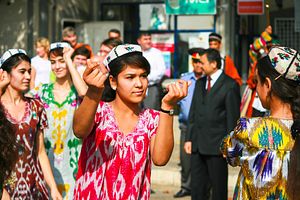Weekend reads:
Mullahs and Marriage: Bruce Pannier, writing for RFE/RL, this week dove into issues of religion, government, tradition and convenience. Two Kyrgyz parliamentarians have introduced legislation to put in place regulations regarding “nikah” ceremonies performed by mullahs. The legislation would require that couples requesting a mullah marry them must also have documentation proving their ages and that they’d registered their union with the government. The issues at hand include underage marriages, but a bigger issues is perhaps the impact that lacking documentation has on women whose husbands divorce them. Without legal proof of the marriage, they have little legal standing to seek alimony or child support.
What Not to Wear in Tajikistan: Hélène Thibault has a brief out through George Washington University’s Central Asia Program this week that tackles the interwoven (pun intended) issues of ideology and “tradition” in Tajikistan, in many ways on display in the focus by authorities on what women wear. Tajikistan has at the same time tried to “instrumentalize religion for legitimacy purposes” while also subordinating religion “to the point that practices are now carefully regulated.” The paper dives further, cataloging authorities’ efforts to reinvent Tajik traditions. Their efforts are problematic, however, because what Tajik authorities call “traditional or national clothes” are in truth Soviet-era styles–not the “burqa-like robes called paranja or chavchan that covered the whole body including the face” that women living in sedentary communities in pre-Bolshevik revolution Uzbekistan and Tajikistan wore. Thibault’s piece dives even deeper, into issues of female virtue, economics and family structure, and the pressures of conformity.
Tajikistan Loves Laws: Tajikistan’s parliament had a busy week: there may be a draft bill in the works to rejigger the constitution with the most significant change being the lowering of the age requirement to run for President (it’s currently set at 35). The suspicion is that this is intended to pave the way for President Rahmon’s son who will be 33 when Rahmon’s current term runs out in 2020. Then there’s the law banning Islamic names–it’s been on the docket for a while. “In a flurry of banning,” Eurasianet writes, “Tajikistan’s lower house of parliament on January 13 voted to make it illegal to give babies non-Tajik names or to seal nuptials without a medical certificate.” To round out the week, Tajikistan decided to raise the age to go on hajj to 40 (it was raised to 35 in April 2015).
Putin’s Ploys in Central Asia: Edward Lemon and Joe Schottenfeld have a piece in Foreign Affairs this week looking at what Russia’s moves in the region actually mean. Moscow emphasizes that its buildups in Central Asia are aimed at helping secure the southern border from trouble brewing in Afghanistan. But, Lemon and Schottenfeld write, “there is more to it than that.” Moscow’s moves to make it more difficult for migrant workers from outside the EEU and can be viewed as a way to pressure non-members, like remittance-dependent Tajikistan, into joining. But the EEU hasn’t been a success (Alex Nice explained how in January’s issue of our magazine) and Russia’s economic trouble has filtered into the region–pushing them to seek closer ties with, as Lemon and Schottenfeld put it, more stable partners like China.

































